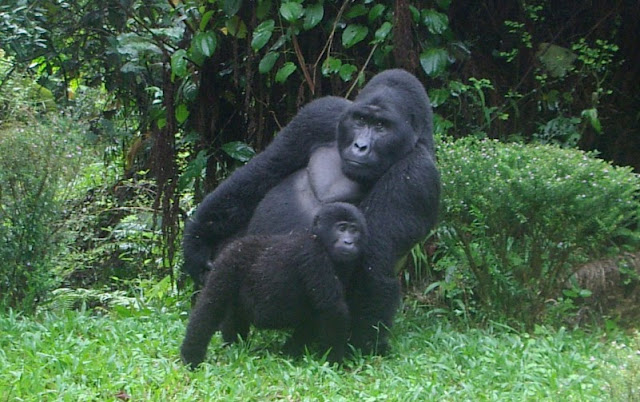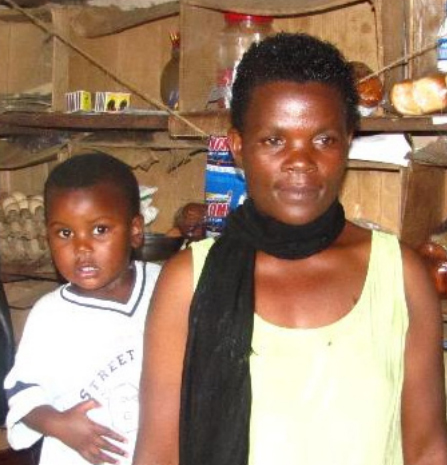This PHE Champion profile was produced by the BALANCED Project.Meet 32 year old Ruth Siyage – a wife, mother, peasant farmer, shop owner, and population, health, and environment (
PHE) champion. Ruth, her husband, Siyage Benon, and their three healthy daughters – ages 3, 6, and 11 – live about an hour from
Bwindi Impenetrable National Park (BINP) in Uganda’s Kanungu District. The 33,000-hectare BINP is a World Heritage Site known for its exceptional biodiversity – with over 200 species of trees, 100 species of ferns, 350 species of birds, 200 species of butterflies, as well as many endangered species, including the mountain gorilla.
In addition to being a peasant farmer who grows potatoes, millet, beans, and groundnuts to feed her family, Ruth also has a small shop in the nearby trading center where she sells groceries and interacts with most of her friends. Ruth first learned of and embraced the PHE approach through a neighbor and local community volunteer, Mrs. Hope Matsiko – one of 29 PHE volunteers trained by the Conservation Through Public Health (CTPH) programs.
Ruth recalls:Hope used to approach us and tell us about family planning. Others refused to listen, but I took it up. Before, I used to refuse to go to Kajubwe Health Center for services and never got information because it was so far away. However, when Hope, the local volunteer, who is also my neighbor, visited me at home, I got more information about family planning. She also counseled me on the methods I could use, which was best for my health and how to use it. I now use family planning.
As a new champion, Ruth uses several ways to teach her community about family planning and PHE activities. One way is through face-to-face discussions with individuals attending village meetings. She focuses on women she sees often and who she knows have closely-spaced pregnancies. Recently, three of these women started using modern contraceptives.
Ruth also spreads her PHE messages through her work with the local women’s association, Kishanda Bakyara Twebiseho (Kishanda Women Livelihoods Association), as an active member of a local church, and as a local village council member. In the council, she is in charge of teaching about agriculture and the environment – a perfect opportunity to share her PHE messages about the linkages between population, health, and the environment. Ruth is a great model of the benefits of taking a PHE approach, with her well-spaced pregnancies – which have helped ensure her own reproductive health and that of her three daughters – and her teaching of others, from what she now knows about the need to keep ourselves and our environment healthy to the impacts of each on the other.
Ruth says she believes that through a PHE approach much can be done and has been done:By teaching people about safe water use, I believe that we can stop diarrhea diseases. And by teaching about sanitation, we can help prevent diseases such as malaria, tuberculosis, and worms. Now my neighbors seldom get sick. We have a fairly healthy life. When we are not sick, we do not have to sell our goats and land to buy medicine. And when we plan our families, we are better able to care for and educate our children. Through our community sensitization, people now even understand the importance of gorilla conservation.
Ruth is especially appreciative of the CTPH program, which first taught her about and then turned her into an advocate for the integrated PHE approach.
This PHE Champion profile was produced by the BALANCED Project. A PDF version can be downloaded from the PHE Toolkit. PHE Champion profiles highlight people working on the ground to improve health and conservation in areas where biodiversity is critically endangered.
Photo Credit: Silverback mountain gorilla named Mwirima with a juvenille gorilla from the Rusguguar group near Bwindi Impenetrable National Park, and Ruth and her son in their shop in rural Uganda, courtesy of CTPH.

 A Publication of the Stimson Center.
A Publication of the Stimson Center.




